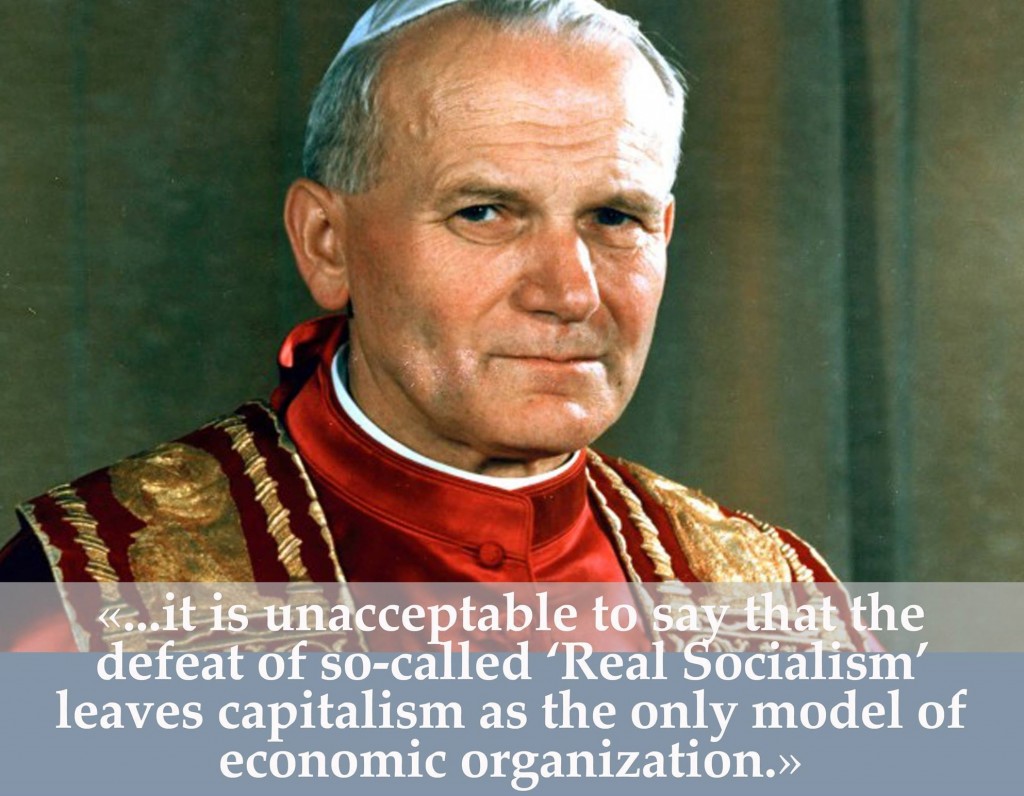
Pope Francis caused a storm of controversy with the tweet, “Inequality is the root of social evil.”
This sent some scrambling to set up a genealogy. From the looks of it Thomas Piketty author of Capital in the 21st Century seems to be the prime suspect. I know next to nothing about this book, so all I can offer you is the following publisher blurb:
“What are the grand dynamics that drive the accumulation and distribution of capital? Questions about the long-term evolution of inequality, the concentration of wealth, and the prospects for economic growth lie at the heart of political economy. But satisfactory answers have been hard to find for lack of adequate data and clear guiding theories. In Capital in the Twenty-First Century, Thomas Piketty analyzes a unique collection of data from twenty countries, ranging as far back as the eighteenth century, to uncover key economic and social patterns. His findings will transform debate and set the agenda for the next generation of thought about wealth and inequality.

Piketty shows that modern economic growth and the diffusion of knowledge have allowed us to avoid inequalities on the apocalyptic scale predicted by Karl Marx. But we have not modified the deep structures of capital and inequality as much as we thought in the optimistic decades following World War II. The main driver of inequality–the tendency of returns on capital to exceed the rate of economic growth–today threatens to generate extreme inequalities that stir discontent and undermine democratic values. But economic trends are not acts of God. Political action has curbed dangerous inequalities in the past, Piketty says, and may do so again.
A work of extraordinary ambition, originality, and rigor, Capital in the Twenty-First Century reorients our understanding of economic history and confronts us with sobering lessons for today.”
I’ll leave the conspiracy theorists to themselves, because the real culprit seems to be something as simple and traditional as Catholic Social Teaching. CST has been battling inequality since Rerum Novarum.
Today’s tweet should only be a surprise to those who have been spoon-fed (crack spoon) their CST from Novak, Weigel, Zmirak et al. But for those who’ve read a little CST the Neo-Con capitalist absolutism is merely another version of the throne and altar arrangement.
They agree to throw holy water on real-existing capitalism because it’s on the up and up and they don’t want to be left behind. The problem with these altar and throne arrangements is that they always inevitably come too late and embrace something that’s on the way out (like absolute monarchy or the nation-state in ages past). Throne and altar arrangements always make the Church look like a fool in the long run.
CST is so much ahead of the curve that I sometimes like to troll friends on facebook by quoting passages from Rerum Novarum and attributing them to Marx. This inevitably leads to at least one respectable academic soiling himself or herself about what jerks Marx and real-existing communism were.
Here’s a favorite passage of mine from Leo XIII (always get them, try this on your friends):

“47. Many excellent results will follow from this; and, first of all, property will certainly become more equitably divided. For, the result of civil change and revolution has been to divide cities into two classes separated by a wide chasm. On the one side there is the party which holds power because it holds wealth; which has in its grasp the whole of labor and trade; which manipulates for its own benefit and its own purposes all the sources of supply, and which is not without influence even in the administration of the commonwealth. On the other side there is the needy and powerless multitude, sick and sore in spirit and ever ready for disturbance. If working people can be encouraged to look forward to obtaining a share in the land, the consequence will be that the gulf between vast wealth and sheer poverty will be bridged over, and the respective classes will be brought nearer to one another.”
John Paul II continued the tradition of CST with the encyclical Centesimus Annus, written to celebrate the 100th anniversary of Rerum Novarum. Look at what he says below falls in line with Leo and Francis.
Let’s face it, CST is the real culprit in this tweet affair, and David L. Schindler is right in arguing that we’ve appropriated it mostly by ignoring it. I would like to advance the hypothesis that, out of pure ignorance, more Catholics are unfaithful to CST than they are unfaithful to the Church’s teaching on contraception.
Here is a fuller context for the passage quoted above in the banner for this post. It’s from Centesimus Annus:
“35. Here we find a wide range of opportunities for commitment and effort in the name of justice on the part of trade unions and other workers’ organizations. These defend workers’ rights and protect their interests as persons, while fulfilling a vital cultural role, so as to enable workers to participate more fully and honourably in the life of their nation and to assist them along the path of development.
In this sense, it is right to speak of a struggle against an economic system, if the latter is understood as a method of upholding the absolute predominance of capital, the possession of the means of production and of the land, in contrast to the free and personal nature of human work.73 In the struggle against such a system, what is being proposed as an alternative is not the socialist system, which in fact turns out to be State capitalism, but rather a society of free work, of enterprise and of participation. Such a society is not directed against the market, but demands that the market be appropriately controlled by the forces of society and by the State, so as to guarantee that the basic needs of the whole of society are satisfied.
The Church acknowledges the legitimate role of profit as an indication that a business is functioning well. When a firm makes a profit, this means that productive factors have been properly employed and corresponding human needs have been duly satisfied. But profitability is not the only indicator of a firm’s condition. It is possible for the financial accounts to be in order, and yet for the people — who make up the firm’s most valuable asset — to be humiliated and their dignity offended. Besides being morally inadmissible, this will eventually have negative repercussions on the firm’s economic efficiency. In fact, the purpose of a business firm is not simply to make a profit, but is to be found in its very existence as a community of persons who in various ways are endeavouring to satisfy their basic needs, and who form a particular group at the service of the whole of society. Profit is a regulator of the life of a business, but it is not the only one; other human and moral factors must also be considered which, in the long term, are at least equally important for the life of a business.
We have seen that it is unacceptable to say that the defeat of so-called ‘Real Socialism’ leaves capitalism as the only model of economic organization. It is necessary to break down the barriers and monopolies which leave so many countries on the margins of development, and to provide all individuals and nations with the basic conditions which will enable them to share in development. This goal calls for programmed and responsible efforts on the part of the entire international community. Stronger nations must offer weaker ones opportunities for taking their place in international life, and the latter must learn how to use these opportunities by making the necessary efforts and sacrifices and by ensuring political and economic stability, the certainty of better prospects for the future, the improvement of workers’ skills, and the training of competent business leaders who are conscious of their responsibilities.74“
Does this resemble anything we’ve inherited in the hell of inequality we’ve created here in the States and abroad? Heck, no.
Break down the barriers and monopolies indeed!
Weigel, Novak and Zmirak, quit with the holy water already.
Postscript: If you’re one of those people who annoyingly insists on a biblical warrant for this sort of thing, there’s yesterday’s first reading. The story of Ananias and Sapphira, also from Acts, adds some context and spice to the picture. Remember what happened to them?











